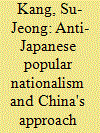| Srl | Item |
| 1 |
ID:
122522


|
|
|
|
|
| Publication |
2013.
|
| Summary/Abstract |
This paper explores the relationship between anti-Japanese popular nationalism and China's approach towards Japan amid Sino-Japanese political tension from 2001 to mid-2006. Among various factors that may affect the relationship, this research focuses on the interaction between the government and the public expressions of anti-Japanese nationalism in China. Throughout most of this period, Sino-Japanese political relations were seriously strained by historical, territorial and other controversial issues, which stirred up anti-Japanese sentiment in China. However, it was only between 2003 and the spring of 2005 that mass anti-Japanese protests were allowed, or at least tolerated, by the Chinese authorities and played a role in Beijing's handling of Japan-related controversies. The paper examines China's domestic political situation during the leadership transition from the third to fourth generation of leaders, which it claims drove the Chinese government's lenient response to popular anti-Japanese protests and enhanced the prospects for popular nationalism to affect the government's approach towards Japan.
|
|
|
|
|
|
|
|
|
|
|
|
|
|
|
|
| 2 |
ID:
148823


|
|
|
|
|
| Summary/Abstract |
This article examines the dynamics of popular mobilisation in autocratic post-communist regimes, focusing on how opposition groups manoeuvre around cultural and structural constraints to inspire ordinary citizens to join street protests, despite the real dangers associated with political action. Using evidence from original interviews with activists in Georgia, Ukraine, and Russia, the article analyses the comparative challenges facing Russian activists in constructing new collective identities for the people they hope will become their followers, through the use of an inclusive, civic nationalism and a narrative that links action in the present to an ongoing, shared historical process.
|
|
|
|
|
|
|
|
|
|
|
|
|
|
|
|